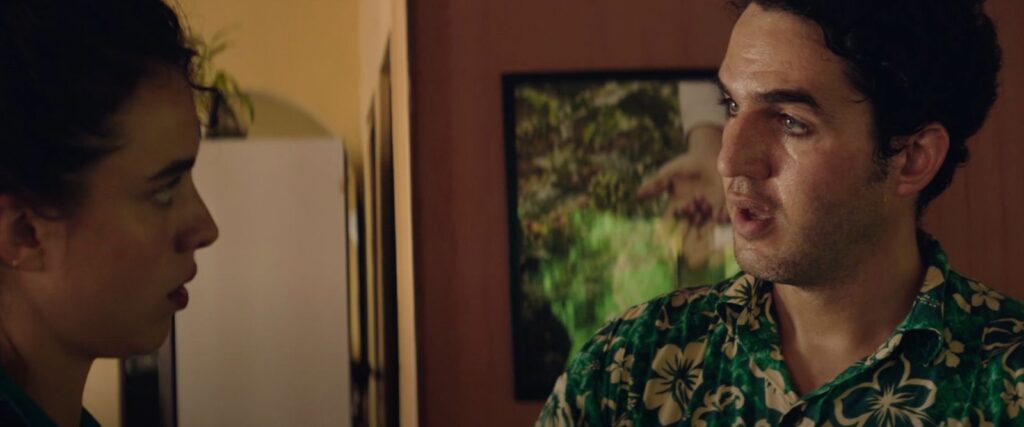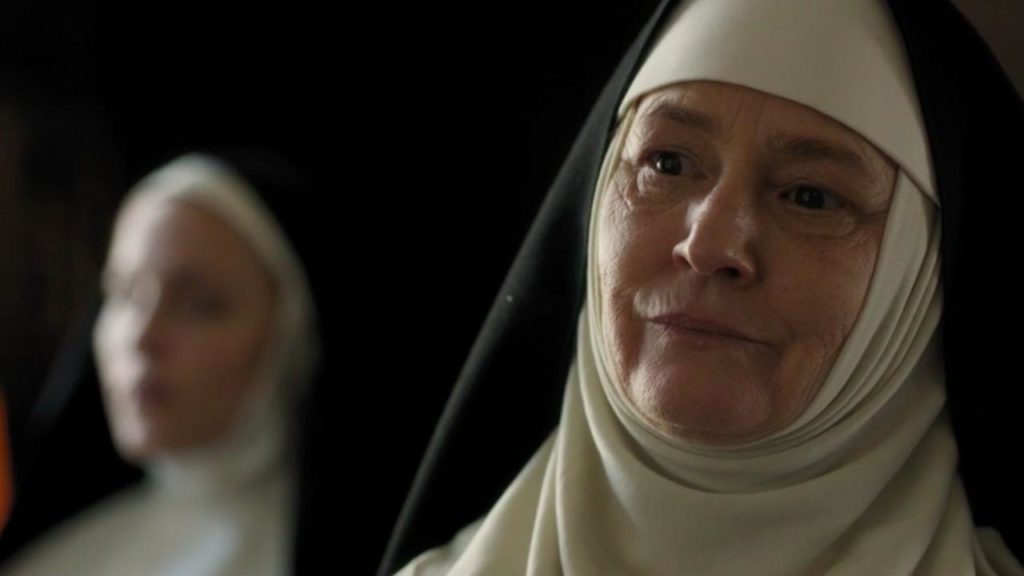
Wow, this movie sizzles with originality and it’s a showcase for an emerging female filmmaker, but I’m not sure if you’ll want to watch it. In The Substance, writer-director Coralie Fargeat comments on all the perversity around the unrealistic ideals of female beauty by reimagining the classic Faustian bargain – what would you give up to restore physical youthfulness? Fargeat has made a sharply funny movie that melds the science fiction and horror genres. It’s absolutely brilliant, but some viewers may not be able to get past the body horror.
Elisabeth (Demi Moore) was a big movie star thirty years ago, and is now starring in a network fitness show (think Jane Fonda’s Workout franchise). Elisabeth is happy with her life until the male suits at the TV network tell that she’s passed her Sell By date and prepare to dump her for a younger, hotter starlet. The shock jars Elisabeth into a desperate spiral of body-loathing. Of course, this is absurd because I would describe Demi Moore as the world’s most beautiful 47-year-old woman, except she’s really 62.
Elisabeth finds a mysterious underground pharmaceutical (called The Substance) that will miraculously take 30 years off her appearance. There is a at least one catch. She has to inject a substance, which triggers the formation of a clone in a separate, younger body – but only for a week; then she needs to recover by re-inhabiting the older body. Off and on she goes, alternating weeks and the older and younger versions. Eventually, she learns about an even more significant side effect.
The clone is Sue (Margaret Qualley), who immediately is hired to replace Elisabeth on the show and vaults to stardom herself. With her celebrity, riches and stunning beauty, Sue’s life is pretty damn great – until each week is over. We soon realize that this is not going to end well for either Elisabeth or Sue.
There is a lot of body horror in The Substance, beginning with an icky “clone birth” scene and the weekly transitions between Elisabeth and Sue. The Substance ends with an over-the-top, splattering finale that makes Carrie look like a finger prick. It’s not going to work for most of my readers whom I know personally. I’m not a big horror fan and especially don’t care for body horror, but I’m glad I hung with it.

The Substance is the second feature for French writer-director Coralie Fargeat. Her first film Revenge (which I haven’t yet seen) won accolades as a feminist take on the rape revenge genre. To keep her right of final cut, Fargeat spurned Hollywood financing and made The Substance on spec. It is now the highest grossing film for MUBI, which bought the distribution rights. She knows what to do with the actors, the camera and the soundtrack, and is unafraid of coloring outside the lines. Wow, Fargeat is impressive.
The first three scenes are enrapturing. The first is an overhead shot of a broken egg, which is injected with a syringe and then clones a second yolk. The second scene is another overhead shot, this one of Elisabeth’s star on the Hollywood Walk of Fame, which traces the arc of her career. The third is of Elisabeth leaving the set of her show, as she absorbs the accolades of her stardom, the unwelcome birthday wishes and some rude hints to her aging out of being a sex symbol. Really smart storytelling.
Predictably, given my personal bias, I thought that the running time 2 hours, 20 minutes was too long, but it’s not like the movie dragged.
The male characters in The Substance are not very smart nor even minimally evolved; they are so broadly played that it’s even fun for men in the audience.
This is career-topping performance for Demi Moore, who , besides being uniquely physically perfect for the role, brings out all of Elisabeth’s yearnings and vulnerabilities – and her fraught ambivalence for continuing with The Substance. Moore is also a good sport about working under some some very extreme prosthetics.
Margaret Qualley always brings energy and magnetism to her performances, and she’s superb here as s Sue who, like Elisabeth, wants it all and wants it too much.
Dennis Quaid takes boorishness to new lows as a shamelessly sexist network boss. Quaid must have had lots of fun in this role, and he’s hilarious.
The Substance got a standing ovation at its premiere at Cannes, and won the People’s Choice Award at Toronto. The Substance is now streaming on Amazon and AppleTV, and it’s free on MUBI.




